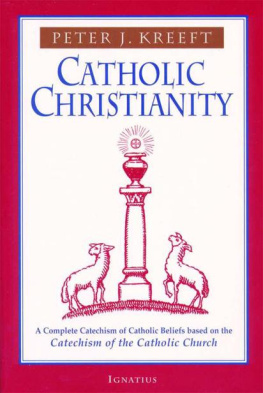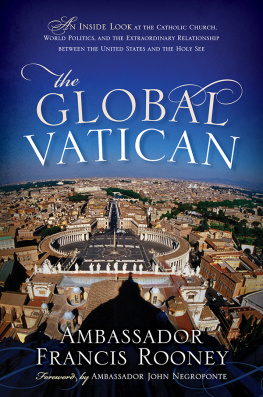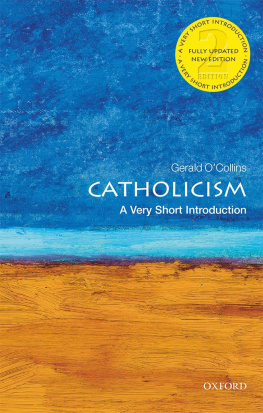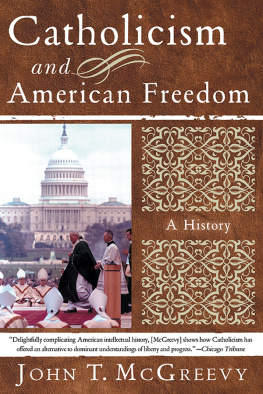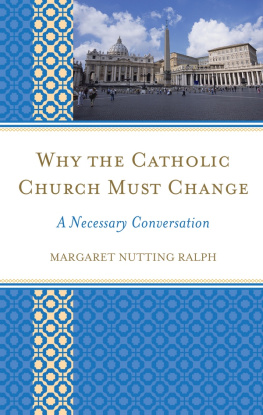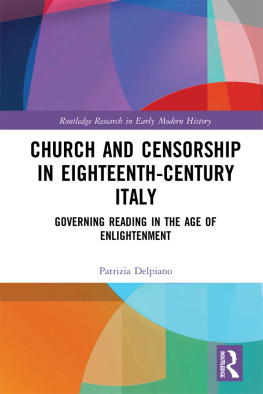ACKNOWLEDGMENTS
If you work on a project long enough, you find yourself swimming in a great ocean of gratitude.
Thanks first, as is always most appropriate for historians, to the generous and knowledgeable archivists and librarians at so many places: especially Charlotte Ames, Kevin Cawley, and Wendy Clauson Schlereth at the University of Notre Dame; and many others at Boston College, the Archdiocese of Chicago, Georgetown University, the Midwest Jesuit Archives in St. Louis, the University of Pennsylvania, Stanford University, and the University of Daytons U.S. Catholic Collection and Marian Library.
Thanks especially to colleagues and friends at the Cushwa Center for the Study of American Catholicism at the University of Notre Dame, who have supported my work from its earliest days to the present: Jay Dolan, Scott Appleby, Barbara Lockwood, Kathleen Sprows Cummings, Timothy Matovina, and Paula Brach. A Research Travel Grant from the Cushwa Center was the first external funding I ever received.
Thanks to those skilled and patient editors at Cornell University Press and Westchester Publishing Services who made the manuscript into a book: Michael McGandy, Sarah Grossman, Susan Specter, and Melody Negron, along with the books indexer, Linda Webster.
Thanks to the great scholars and generous human beings who shaped my thinking on literature, history, and cultureAnthony N. B. Garvan, Henry H. Glassie, Francis J. Henninger, Murray G. Murphey, Janice A. Radway, Barbara Herrnstein Smith, and Don Yoder. Thanks also to the supportive administrator-scholars, my colleagues and friends at the University of Dayton, without whom few of us could do what we do, especially Frank Lazarus, Paul Morman, Mary Morton, Paul Benson, and Julius Amin.
Thanks to the colleagues and friends who read and discussed and responded to endless versions of the projectMike Barnes, Dennis Doyle, Jim Heft, Therese Lysaught, Jack McGrath, Maureen Tilley, Terry Tilley, Sandra Yocum (all former stalwarts of the DGDG), and several lively and useful colloquia with my History Department colleagues.
Thanks to other gracious colleagues and friends in Catholic Studies, at the University of Dayton and elsewherePhil Gleason, David OBrien, Jim Fisher, Nicoletta Hary, John McGreevy, Maggie McGuinness, Bill Portier, Ellen Skerrett, and Tony Smith.
Thanks for general solidarity and sustenance of all kinds to dear friends Liesl Allingham, John Benvenuto, Ellen Fleischmann, Larry Flockerzie, Mary Harvan Gorgette, Barbara Heath, Carol Engelhardt Herringer, Kelly Johnson, Caroline Merithew, and Bill and Sue Trollinger.
Three colleagues and friends read the manuscript at a crucial point, and their (independent) responses convinced me that it was a book: Steve Dandaneau, Carol Herringer, and Jim Heft.
My deepest thanks to all of these people, because it is thanks to them that I was able to bring this project to completion. Its strengths are largely theirs; its weaknesses are all mine.
This is, first and foremost, for my parents, William and Sarah Cadegan, because if we are, as I believe, nothing other than the culmination of all the ways in which we have been loved, then most of the good of any kind of which I am capable is due to them.
Introduction
The Cultural Work of Catholic Literature
At the close and climax of James Joyces 1916 novel, A Portrait of the Artist as a Young Man , the protagonist Stephen Dedalus announces to himself and to the ages his newly embraced mission: Welcome, O life! I go to encounter for the millionth time the reality of experience and to forge in the smithy of my soul the uncreated conscience of my race. In its emphasis on the primacy and immediacy of individual consciousness, and on the artists making something that had no previous history, Stephens pronouncement is perhaps the most famous epigraph of literary modernism. Portrait of the Artist s stylistic innovations and its story of a young mans severing of every tie that had defined himfamily, church, nationexemplify modernisms break with the past, its rejection of artistic and social convention, its restless attempt to see the world afresh.
On the other side of the Atlantic, Catholic World , a literary magazine that had by 1917 been published for nearly fifty years by the Paulist Fathers, included a review of Portrait of the Artist in its June New Books section. The review took a less exalted view of Stephen Dedaluss ambition, describing Joyces work as a story of a young Irishmans loss of faith and the picture of the inside of one abnormally self-centred mind. The reviewer conceded that the novels distinctive stylistic featurescutting of transitions, the deliberate lack of reserve which forces upon the reader an appalling intimacy, the
Time would seem to have vindicated Stephen Dedalus. Joyce reigns as one of the towering literary talents of the century. His early champions appear prescient and discerning, his opponentsmost notoriously those in Ireland, England, and the United States who sought to prevent publication of his 1922 masterwork, Ulysses , on grounds of obscenityrepressed and repressive, deserving of the mockery and rejection to which Joyce and his contemporaries subjected them.
Joyces opponents might be forgiven for failing to perceive the signs of a sea change in modern sensibilities. Writing in 1924, Virginia Woolf devised one of the most useful hyperboles in twentieth-century literary criticism: On or about December 1910 human character changed. The phrase captures both the rupture triggered by the emergence of literary modernism and the impossibility of dating it precisely. It captures as well Woolfs conviction that modernists were expressingmust expressa transformation that had occurred in the world outside the novel. Those capable of recognizing and expressing the change belonged to the future; those incapable, to the past.
Was the Catholic World review therefore simply predictable evidence of a reflexive antimodernism, of the inability of a Catholic publication to recognize contemporary genius and to sympathize with contemporary dilemmas? A yes-or-no answer to such a question obscures what is most interesting about the issues and people involved. In reviews like this one, in dozens of magazines and hundreds of booksin fact, within an entire alternative literary cultureU.S. Catholics worked out a distinctive literary vision, shaped not solely by opposition to the centurys secular literary trends but more deeply by their own categories and criteria for defining and evaluating literature. In so doing, they simultaneously addressed theological, philosophical, and historiographical questions crucial to the relationship between Roman Catholicism and modernity. The responses they formulated to these questions make U.S. Catholic literary cultureits literary vision, the people who articulated it, and the institutions within which it was fostereda valuable and overlooked source for understanding the intellectual history of U.S. Catholicism in the twentieth century.


